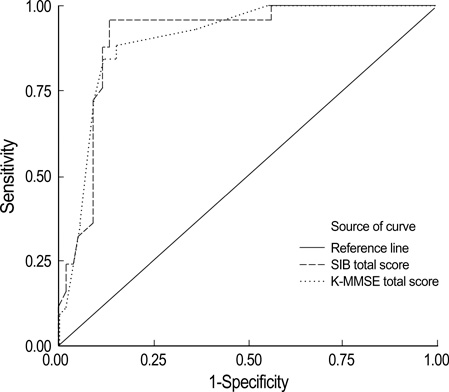J Korean Med Sci.
2006 Jun;21(3):506-517. 10.3346/jkms.2006.21.3.506.
Reliability and Validity of the Severe Impairment Battery (SIB) in Korean Dementia Patients
- Affiliations
-
- 1Samsung Biomedical Research Institute, Samsung Medical Center, Korea.
- 2Department of Psychiatry, Samsung Medical Center, Sungkyunkwan University School of Medicine, Seoul, Korea. paulkim@smc.samsung.co.kr
- 3Department of Psychiatry, SunHospital, Daejeon, Korea.
- 4Department of Psychiatry, University of Pittsburgh, Pittsburgh, PA, U.S.A.
- KMID: 1778437
- DOI: http://doi.org/10.3346/jkms.2006.21.3.506
Abstract
- This study was conducted to examine the reliability, validity and clinical utility of the Severe Impairment Battery (SIB) for a Korean population. 69 dementia patients with Clinical Dementia Rating (CDR) stages 2 or 3 were participated in this study. The SIB, Korean version-Mini Mental State Examination (K-MMSE), CDR, and Seoul-Activities of Daily Living (S-ADL) were administered. The validity of the SIB was confirmed by evaluating the correlation coefficients between the SIB and K-MMSE, CDR, S-ADL, which were found to be significant. Cronbach's alpha for the total SIB score and each subscale score showed high significance, and the item-total correlation for each subscale was also acceptable. The test-retest correlation for the total SIB score and subscale scores were significant, except for the praxis and orienting to name. The total SIB score and subscale scores were examined according to CDR. The results suggest that the SIB can differentiate the poor performances of severely impaired dementia patients. On the basis of the receiver operating characteristic (ROC), it can be concluded that the SIB is able to accurately discriminate between CDR 2 and 3 patients. The results of this study suggest that the SIB is a reliable and valid instrument for evaluating severe dementia patients in Korean population.
Keyword
MeSH Terms
Figure
Cited by 1 articles
-
Clinical practice guideline for dementia by Clinical Research Center for Dementia of South Korea
Bon D. Ku, Shin Gyeom Kim, Jun-Young Lee, Kee Hyung Park, Joon Hyun Shin, Kwang Ki Kim, Young Chul Youn, Yung Min Lee, Chang Hyung Hong, Sang Won Seo, Duk L. Na, Sung Yoon Kim, Hae-Kwan Cheong, Doh Kwan Kim, Jae-Hong Lee, SangYun Kim, Byeong Kil Yeon, Soo Young Kim, Seol-Heui Han
J Korean Med Assoc. 2011;54(8):861-875. doi: 10.5124/jkma.2011.54.8.861.
Reference
-
1. Schmitt FA, Ashford W, Emesto C, Saxton J, Schneider LS, Clark CM, Ferris SH, Mackell JA, Schafer K, Thal LJ. The severe impairment battery: concurrent validity and the assessment of longitudinal change in Alzheimer's disease. The Alzheimer's disease cooperative study. Alzheimer Dis Assoc Disord. 1997. 11:51–56.2. Morris JC. The Clinical Dementia Rating (CDR): Current version and scoring rules. Neurology. 1993. 43:2412–2414.3. Reisberg B, Ferris SH, DeLeon MJ, Crook T. The Global Deterioration Scale for assessment of primary degenerative dementia. Am J Psychiatry. 1982. 139:1136–1139.4. Benesch CG, McDaniel KD, Cox C, Hamill RW. End-stage Alzheimer's disease: Glasgow Coma Scale and the neurologic examination. Arch Neurol. 1993. 50:1309–1315.5. Peavy GM, Salmon DP, Rice VA, Galasko D, Samuel W, Taylor KI, Ernesto C, Butters N, Thal L. Neuropsychological Assessment of severely demented elderly: The Severe Cognitive Impairment Profile. Arch Neurol. 1996. 53:367–372.6. Cossa FM, Fabiani M, Farinato A, Laiacona M, Capitani E. The preliminary neuropsychological battery: An instrument to grade the cognitive level of minimally responsive patients. Brain Inj. 1999. 13:583–592.7. Albert M, Cohen C. The test for severe impairment an instrument for assessment of patients with severe cognitive dysfunction. J Am Geriatric Soc. 1992. 40:449–453.8. Saxton J, McGoingle-Gibson K, Swihart A, Miller M, Boller F. Assessment of the severely impaired patient: description and validation of a new neuropsychological test battery. Psychol Assess. 1990. 2:298–303.
Article9. Folstein MF, Folstein SE, McHugh PR. Mini-Mental State: a practical method for grading the cognitive state of patients for clinician. J Psychiatr Res. 1975. 12:189–198.10. Barbarotto R, Cerri M, Acerbi C, Molinari S, Capitani E. Is SIB or BNP better than MMSE in discriminating the cognitive performance of severely impaired elderly patients? Arch Neurol. 2000. 15:21–29.
Article11. Kim TY, Kim SY, Kim JW, Lim BH. Severe Dementia Rating Scale: The mental status examination for moderate to severe Alzheimer's disease patients. J Korean Dementia Assoc. 2002. 1:113–116.12. Kang Y, Na DL, Hahn S. A validity study on the Korean Mini-Mental State Examination (K-MMSE) in dementia patients. J Korean Neurol Assoc. 1997. 15:300–308.13. American Psychiatric Association. Diagnostic and Statistical Manual of Mental Disorder. 1994. 4th ed.14. McKhann G, Drachman D, Folstein M, Katzman R, Price D, Stadlan E. Clinical diagnosis of Alzheimer's disease: report of the NINCDS-ADRDA Work group under the auspices of Department of Health and Human Services Task Force on Alzheimer's disease. Neurology. 1984. 34:939–944.
Article15. Ku HM, Kim JH, Lee HS, Ko HJ, Kwon EJ, Ahn SM, Kim DK. A study on the reliability and validity of Seoul-Activities of Daily Living (S-ADL). J Korean Geriatr Soc. 2004. 8:206–214.
- Full Text Links
- Actions
-
Cited
- CITED
-
- Close
- Share
- Similar articles
-
- Clinical Efficacy and Safety of Memantine in Patients with Moderate to Severe Dementia
- Validity of the Tablet-Based Digital Cognitive Test (SCST) in Identifying Different Degrees of Cognitive Impairment
- A Study on the Reliability and Validity of Seoul-Activities of Daily Living(S-ADL)
- Validity and Reliability of the Korean Version of the Apathy Evaluation Scale Short form for Patients with Dementia
- Seoul Neuropsychological Screening Battery-Dementia Version (SNSB-D): A Useful Tool for Assessing and Monitoring Cognitive Impairments in Dementia Patients


